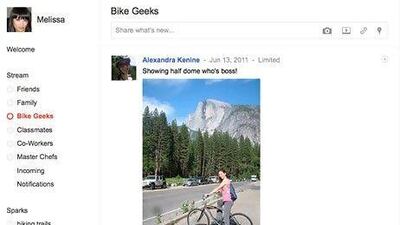Facebook is feeling the breath of Google and MySpace on its neck. Growing competition to the social networking site is also coming from smaller rivals and from markets such as the Middle East.
More Business news: Editor's pick of today's content
Saudi first to react to ratings cut for the US Saudi Arabia's stocks lose around US$7.5 billion yesterday as the kingdom's bourse reacts to the US losing its top-tier credit rating from Standard & Poor's.. read article
Abu Dhabi's new financial heart starts to beat After four years in development, Sowwah Island is preparing to receive its first tenant this month and readies for a grand launch at the end of the year. read article
Retailers relish booming Ramadan The majority of UAE retailers expect a boost in sales during Ramadan, according to a poll of executives by The National. Read article
Although only in its test phase, Google's social networking service Google+, launched in late June, has already attracted 25 million users, according to the internet research company comScore. A growing number of software developers are also drawn to Google+. MySpace's new owners have also vowed "to make MySpace cool again".
Despite the market view of Facebook's dominance of social networking being near impregnable, Google is more aware than any other internet company that, on the internet, competition is only a click away.
Google is determined to attract customers by dovetailing its new social networking service with existing services such as Google search, where it is already the market leader.
Two-thirds of respondents to a survey carried out last month by the software developer Appcelerator and the research company IDC said Google+ would catch up Facebook in terms of user popularity. Of the respondents, 68 per cent said that leveraging Google's existing assets such as internet search, online video site YouTube and Google Maps would enable Google+ to quickly narrow Facebook's market lead.
The study concludes, however, that, while Google+ may be the future, 83 per cent of the social networking developers who responded said they already used or were planning to use Facebook this year. Twitter came second at 73 per cent with Google+ following close after at 72 per cent. But some analysts believe that Google+ still has a lot more catching up to than these figures might suggest.
Adrian Drury, a principal analyst at the research company Ovum, says: "Any new market entrant has a mountain to climb, even if it has a large existing user asset such as Google, Apple or Microsoft … Growth of smartphones in emerging markets is also putting social communications in the hands of consumers in developing markets and this is bringing new audiences to the established platforms such as Facebook and Twitter."
Tim Shepherd, a senior analyst with the research company Canalys, says Google+ has rocketed to about 25 million users globally in a short space of time, "but it must reach a critical mass and prove sustainably interesting and valuable to its users before it can be judged a success.
"That will require considerable further growth around the world over the coming months and years … Google+ occupies the same space as market leader Facebook with little to truly differentiate it."
But all internet companies, even Facebook, are potentially vulnerable to the impact of new services.
"Facebook's position cannot be considered impregnable in light of the way in which Facebook itself was able to topple former market leader MySpace," says Mr Shepherd.
However, despite no longer being owned by News Corp and now under more nimble management, few analysts believe MySpace can wrest its former market lead from Facebook, which has 750 million users.
Analysts also say Facebook may have pulled ahead of rivals in the mobile social networking market. When they first appeared two years ago, location-based services such as foursquare and Gowalla were seen as a threat to Facebook.
But when Facebook Places, a similar service to foursquare that enables social networkers to let their friends know their whereabouts in real time, launched in the US a year ago, some analysts said Facebook had leapfrogged its new competitors. Nevertheless, foursquare's customer base continues to grow.
"Foursquare continues to see respectable growth despite competition from Facebook's location-based service. When Facebook Places launched, foursquare had three million users; today, it has more than 10 million," says Mr Shepherd.
But the real threat to Facebook, and also to rivals such as Google+, may come from the world's emerging markets, including the Middle East, which represent a huge potential market for internet-based social networking services.
"Social media in the Middle East is dominated by Twitter and Facebook," says Mr Drury. "Now that commerce has woken up to the level of traction of these two platforms, there is a rush by marketeers to exploit them in the region.
"The Middle East is going to generate its fair share of social customer data. Local startups are integrating social functionality into their services, putting an Arabic spin on models such as group-buying and on-demand video."
While internet titans such as Facebook and Google slug it out for global dominance, more nimble competitors in emerging markets such as the Middle East are already starting to tailor their offerings to local tastes and customs, eschewing the one size fits all approach of their global competitors.

